Publications
For submission of articles or Working Papers to CEsA, please send an email to:
comunicacao@cesa.iseg.ulisboa.pt
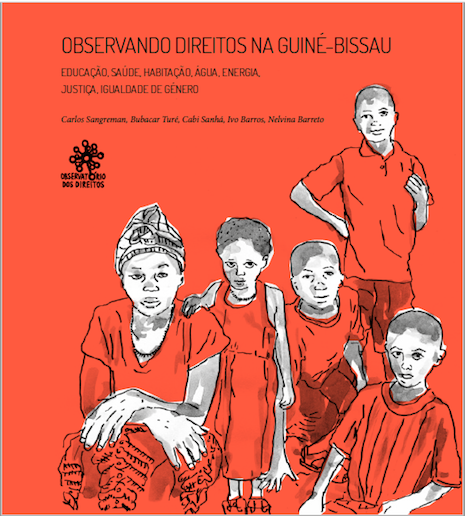
Observando direitos na Guiné-Bissau: educação, saúde, habitação, água, energia, justiça, igualdade de género
The Rights Observatory integrated in a structure such as Casa dos Direitos is an example of what civil society can do in fragile social contexts, but where power respects the Right to Opinion (even if at some times there is repression of media outlets such as radios and television and a climate of threat to critics of the situation at the time). The data collected on access to Economic and Social Human Rights, disseminated through books and exhibitions, in order to be used by activists and responsible authorities, has even been the basis for academic research at undergraduate, master’s and, this year, doctoral levels, especially in Portugal and Brazil.
Abstract:
The objective of Observando direitos na Guiné-Bissau: educação, saúde, habitação, água, energia, justiça, igualdade de género and the Observatório dos Direitos in 2019 was to continue the collection of data on access to Economic and Social Human Rights in Guinea-Bissau with data comparable to those of 2016, and to include two innovations: a new chapter on Women’s Rights or Equality of Gender and perform data collection also in the Bolama/ Bijagós region.
Quotation:
Sangreman, Carlos [et al.] (2020). Observando direitos na Guiné-Bissau : educação, saúde, habitação, água, energia, justiça, igualdade de género. Lisboa: ACEP, com LGDH e CEsA. URL: https://www.repository.utl.pt/handle/10400.5/20866
Access the article here.

Estudos sobre o Oceano Índico: antologia de textos teóricos
Estudos sobre o Oceano Índico: Antologia de Textos Teóricos is a book that gathers eleven theoretical texts by some of the most important thinkers on Indian Ocean Studies (IOS). This set of texts translated into an anthology, among other aspects, intends to give an account of the disciplinary polyphony that counter-punctuates the history of the Indian Ocean, while reflecting on the solidary cultural networks that are woven in the liquid and insular spaces, ports and port cities that climb the Indian Ocean rim from the African continent to India, based on the assumption that the Indian Ocean configures an identity and cultural geography of transnational nature.
Abstract:
Estudos sobre o Oceano Índico: Antologia de Textos Teóricos is a book that gathers eleven theoretical texts by some of the most important thinkers on Indian Ocean Studies (IOS).
In the framework of the Project NILUS – Narratives of the Indian Ocean in the Lusophone Space (https://cesa.rc.iseg.ulisboa.pt/nilus/), the research group started to map the main lines of disciplinary reflection in this area through a survey of theoretical texts written in English and French, by historians, writers and scholars of the human and social sciences, from South Africa, Mauritius, Reunion Island, Madagascar and India.
This set of texts translated into an anthology, among other aspects, intends to give an account of the disciplinary polyphony that counterpointingly animates the history of the Indian Ocean, while reflecting on the solidary cultural networks that are woven in the liquid and insular spaces, in the ports and port cities that climb the Indian Ocean rim from the African continent to India, based on the assumption that the Indian Ocean configures an identity and cultural geography of a transnational nature. In addition, there is also the need to re-signify and re-articulate this field of studies in Portuguese-speaking contexts through a critical and methodological dimension not necessarily related to the imperial narrative, especially now that the very notion of discoveries and discoveries is under a deep – and necessary – conceptual, historiographical and political scrutiny prompted by the project of creating a Museum of Discoveries.
In the texts translated here, the various types of religiosities and peoples, travellers and workers are also represented and historised, with their experience of migration and displacement, reconfigured in a similar material culture, in which gastronomy, cloths and maritime practices are given a prominent role. The topics of the sea, such as boats, monsoons, fishing and networked narratives about travel imaginaries and myths, are also other aspects that fall within diversified disciplinary articulations such as ecology and ecocriticism. In fact, the presence of the non-human – in its multiple material, geological, organic, non-organic declinations, etc. – in the texts gathered here, points to the growing interrogation, already raised by Isabel Hofmeyr, about the theoretical emergence of ‘oceanic ontologies’ through which to rethink the oceans – and the Indian Ocean in particular – not only as backdrops and contexts, but also as actors/subjects/producers of narratives.
Quotation:
Leite, Ana Mafalda, Elena Brugioni e Jessica Falconi, org. (2020). Estudos sobre o Oceano Índico : antologia de textos teóricos – excertos. Lisboa: CEsA/ISEG. URL: https://www.repository.utl.pt/handle/10400.5/19965

Inovação para os objectivos de desenvolvimento sustentável
Inovação para os objectivos de desenvolvimento sustentável by Luís Pais Bernardo is a guide to perplexity. Innovation for Development is the subject of reports, studies and international conferences. Laboratories, centres and initiatives multiply. Innovation models, innovation at scale and the impacts of innovation are discussed. But the fundamental questions remain. What is Innovation (for Development)? What is it for? How is it done? And is it worth doing? These are the questions that the entire international development community has been asking, without pause, for a decade. This report is a guide that does not aim to discover the origin of the practices and discourses of Innovation for Development. Nor do we intend to draw up a compendium of innovations. Our ambition is somewhat more pragmatic: to provide concrete answers to immediate questions and to help build a stronger debate on development, development cooperation and innovation in development cooperation. Where necessary, we explore important questions that are reflected in innovation practice: for example, Innovation for Development is an answer to the problem of ODA effectiveness and a priority of the 2030 agenda. Why does this matter? Because it has implications for the financing, practice, impact, scale and evaluation of development cooperation.
Abstract:
What is Innovation for Development? What is it for? How is it done? And how does it differ from innovation in other sectors? This report is an answer to those questions. Between 2015 and 2030, the Sustainable Development Goals are the great global challenge. Innovation for Development emerged in response to a complex debate on aid effectiveness. Today, the questions are different: how can we innovate to achieve the SDGs? In this report, we focus on clarifying basic terms: innovation, scale and impact. We discussed the need to structure Innovation for Development around five components: learning, creating, organizing, leading and collaborating.
Quotation:
Bernardo, Luís Pais (2020). Inovação para os objectivos de desenvolvimento sustentável. Lisboa: CEsA – Centro de Estudos sobre África e Desenvolvimento/ISEG. URL: https://www.repository.utl.pt/handle/10400.5/20052
Access the article here.

Sector privado, inovação e ODS
In Sector privado, inovação e ODS, Luís Pais Bernardo explores the reasons why companies can and should adopt business models aligned with the SDGs, in partnership with international cooperation actors. Partnerships are key to this transformation; today, business economic activity tends to move along global value chains in which the intervention of international cooperation for development, around the 2030 Agenda, will have an increased impact. In this context, the inclusive and responsible management of the procurement of services and products on a global scale by companies becomes increasingly important. Partnerships, global value chains and procurement of goods and services are the three areas explored in this report.
Abstract:
The central role of the private sector in international development cooperation is one of the innovations of the 2030 Agenda. In 2014, UNCTAD estimated the annual funding gap for the Sustainable Development Goals (SDGs) at US$2.5 billion. Following the Busan summit and the conclusions of the Millennium Development Goals (MDGs), the capabilities, resources and skills of the private sector are no longer viewed with suspicion, but are seen as central to achieving the 17 SDGs. Innovation, as a pillar of the private sector in the 20th century XXI, is the new paradigm. In this report, we explore the reasons why companies can and should adopt business models aligned with the SDGs, in partnership with international cooperation actors. Partnerships are key to this transformation; today, business economic activity tends to move along global value chains in which the intervention of international cooperation for development, around the 2030 Agenda, will have an increased impact. In this context, the inclusive and responsible management of the acquisition of services and products on a global scale by companies, assumes an increasing importance. Partnerships, global value chains and procurement of goods and services are the three areas explored in this report.
Quotation:
Bernardo, Luís Pais (2020). Sector privado, inovação e ODS. Lisboa: CEsA – Centro de Estudos sobre África e Desenvolvimento/ISEG. URL: https://www.repository.utl.pt/handle/10400.5/20053
Access the article here.
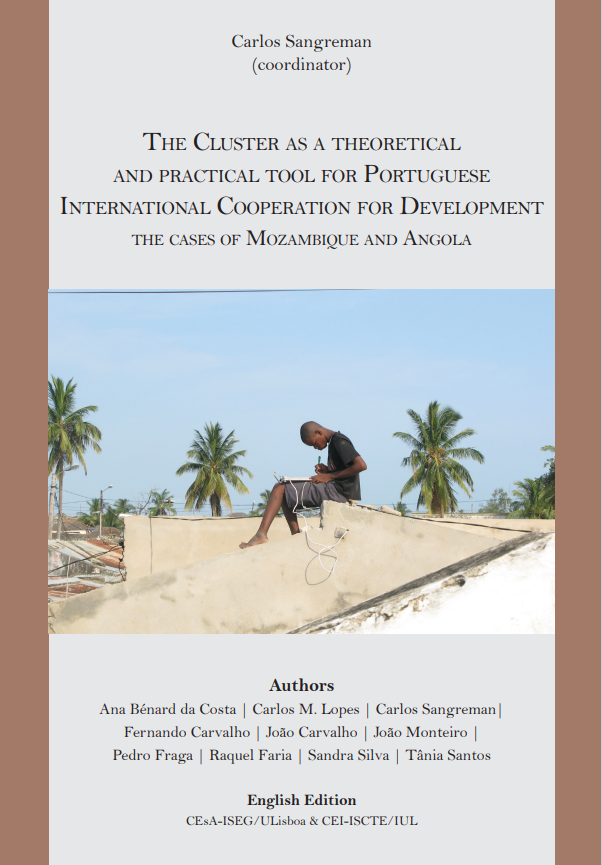
The Cluster as a Theoretical and Practical Tool for Portuguese International Cooperation for Development: The cases of Mozambique and Angola
Abstract:
The Cluster as a theoretical and practical tool for Portuguese International Cooperation for Development: the cases of Mozambique and Angola seeks to provide a contribution towards knowledge of the theory and practical effects of the new instrument in the hands of Portu¬guese cooperation for development – clusters in cooperation – both in re¬gard to the countries receiving international aid and in terms of the effect that its creation and implementation may have, through what we can call the “boomerang effect”, on the reform of public and private cooperation institutions in Portugal, above all at the Instituto de Apoio ao Desenvol¬vimento (the Development Support Institute – IPAD). As for the theoretical side, we maintain that it is only the connection of this concept to benchmarking, as it is taken to mean in the reform of public administration currently underway, that will turn it into a real poli¬cy measure, as opposed to virtual measures that are announced and never put into practice. Then it can provide an innovative contribution to the re¬form of public institutions and the non state actors who make up the field for Portuguese cooperation, which operates within the current framework of international consensus about the area, and the public administration reform policy of the current government. In terms of practical operations, we maintain that that this should be achieved by a flexible model that is perfectly feasible and not in any way Utopian. With this model, cooperation programmes can be developed which are the tailor made for the priorities in each country. This can be carried out by using the methodology of partnership and the evaluation of those results that give the best quality and are the most participative possible in all the phases of identification, conception, implementation and evaluation. This means keeping in mind the Portuguese political op¬tions and those of the partner countries, as well as the coherence, consis¬tency and institutional capacity of both sides. Experiences are needed of other countries that finance cooperation, and reference must be made to the most advanced cluster in Portugal – the project for the Island of Mozambique – as well as putting forward proposals for making the clusters operational. These can form a template of what Portugal can set out for the countries with which it is coopera¬ting, and can then also be extended to what we think could be the trans¬formations in Portuguese institutions of the “field” in the light of the ideas expressed here.
Quotation:
Sangreman, C., coord. (2017). The Cluster as a theoretical and practical tool for Portuguese International Cooperation for Development: the cases of Mozambique and Angola. Lisboa: ISEG – CEsA & CEI-ISCTE/IUL.

Diáspora Cabo-Verdiana: Temas em debate
Abstract:
The idea of this collection originates from the interest in retaining in the same work important themes that are currently under debate and that the social sciences have been addressing regarding the Cape Verdean diaspora. From specific theoretical fields and their own empirical work, the authors choose the Cape Verdean diaspora society as their object, exploring dynamics that together make up the Cape Verdean diasporic space and describe the complexity inherent to its constitution. We aimed at gathering contributions that are not only concerned with mapping the current global dispersion of Cape Verdeans (including the second third resettlements in locations such as, for instance, the Schengen area, after the insertions of the first Cape Verdeans in Europe) but, above all, with deciphering the complex processes of diasporisation. We hope that Diáspora Cabo-verdiana: temas em debate will contribute to reinforce the attention of social scientists regarding the ways in which the Cape Verdean diaspora is constituted in temporal and spatial terms, the engagement of communities among themselves and with Cape Verde, knowing that this, in turn, also experiences, in its temporal and spatial structure, new ways of remembering, imagining and engaging its diaspora today.
Quotation:
Évora, Iolanda (coord.) /2016). Diáspora Cabo-verdiana: temas em debate. Lisboa: CEsA – Centro de Estudos sobre África, Ásia e América Latina.
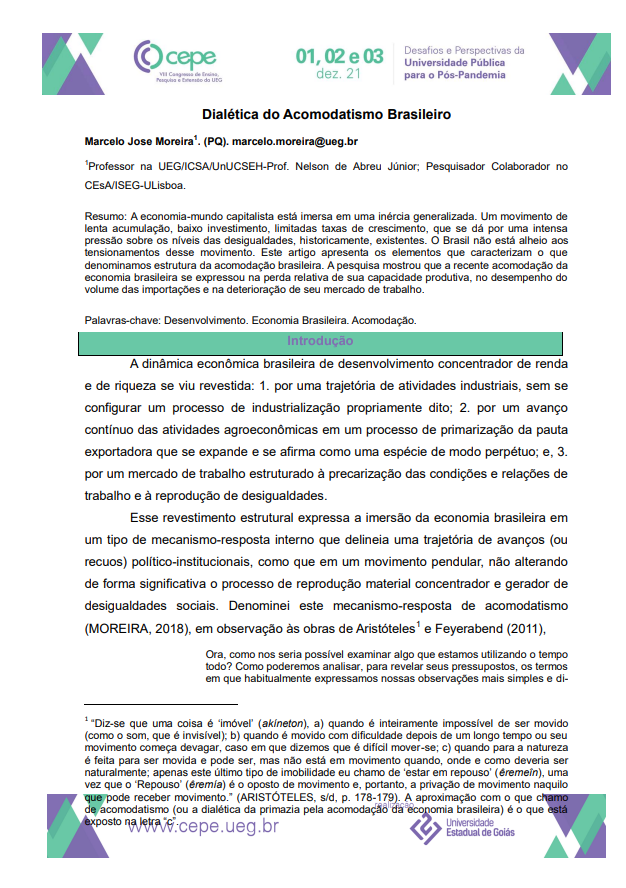
Dialética do Acomodatismo Brasileiro
Abstract:
The capitalist world-economy is immersed in a generalised inertia. A movement of slow accumulation, low investment, limited growth rates, which comes about through intense pressure on the levels of inequalities historically existing. Brazil is not alien to the tensions of this movement. Dialética do acomodatismo Brasileiro presents the elements that characterize what we call the structure of Brazilian accommodation. The research showed that the recent accommodation of the Brazilian economy was expressed in the relative loss of its productive capacity, in the performance of the volume of imports and in the deterioration of its labour market. The Brazilian economic dynamics of income and wealth concentrating development was covered by: 1. a trajectory of industrial activities, without setting up an industrialisation process as such; 2. a continuous advance of agro-economic activities in a process of primarisation of the export roster which expands and asserts itself as a kind of perpetual mode; and 3. a labour market structured towards precarious conditions and labour relations and the reproduction of inequalities. From the accommodationist perspective presented here, the IA-Br showed that the recent accommodation of the Brazilian economy was due to a significant performance of the external sector, to the relative but not significant loss of its productive capacity and to the upsurge of its labour market, which, added to the recent political-institutional alterations, characterise the Brazilian Accommodation Structure.
Quotation:
Moreira, Marcelo José (2021). “Dialética do acomodatismo Brasileiro”. Comunicação apresentada no VIII Congresso de Ensino, Pesquisa e Extensão da Universidade Estadual de Goiás (Cepe|UEG), Universidade Estadual de Goiás, Anápolis
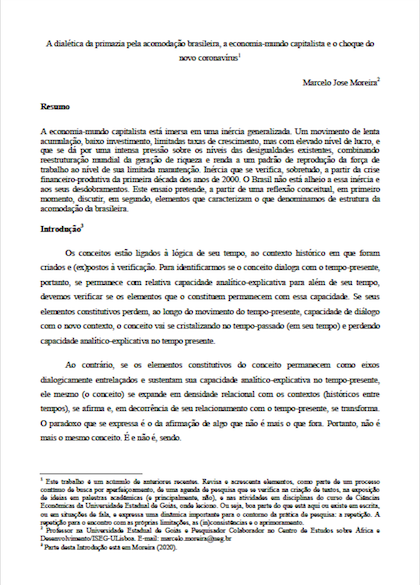
A dialética da primazia pela acomodação brasileira, a economia-mundo capitalista e o choque do novo coronavírus
A dialética da primazia pela acomodação brasileira, a economia-mundo capitalista e o choque do novo coronavírus by Marcelo José Moreira seeks to insert a conceptual proposal which, although initial and immersed in a reflection of an eminently analytical nature, suggests a way of abstracting how Brazilian underdevelopment-dependency is structured in the present-time, from an accommodationist perspective.
Abstract:
The capitalist world-economy is immersed in a generalized inertia. A movement of slow accumulation, low investment, limited growth rates, but with a high level of profit, and which is given by intense pressure on the levels of existing inequalities, combining a worldwide restructuring of wealth and income generation with a workforce pattern of reproduction to the level of its limited maintenance. Inertia that is verified, mainly, from the financial-productive crisis of the first decade of the 2000s. Brazil is not oblivious to this inertia and its consequences. This essay aims, from a conceptual reflection at first, to discuss, secondly, elements that characterize what we call the structure of Brazilian Accommodation.
Quotation:
Moreira, Marcelo José (2021). “A dialética da primazia pela acomodação brasileira, a economia-mundo capitalista e o choque do novo coronavírus”. Comunicação apresentada no 15º Colóquio Brasileiro em Economia Política dos Sistemas-Mundo: Pandemia e tendências seculares da economia-mundo capitalista , Florianópolis, Universidade Federal de Santa Catarina
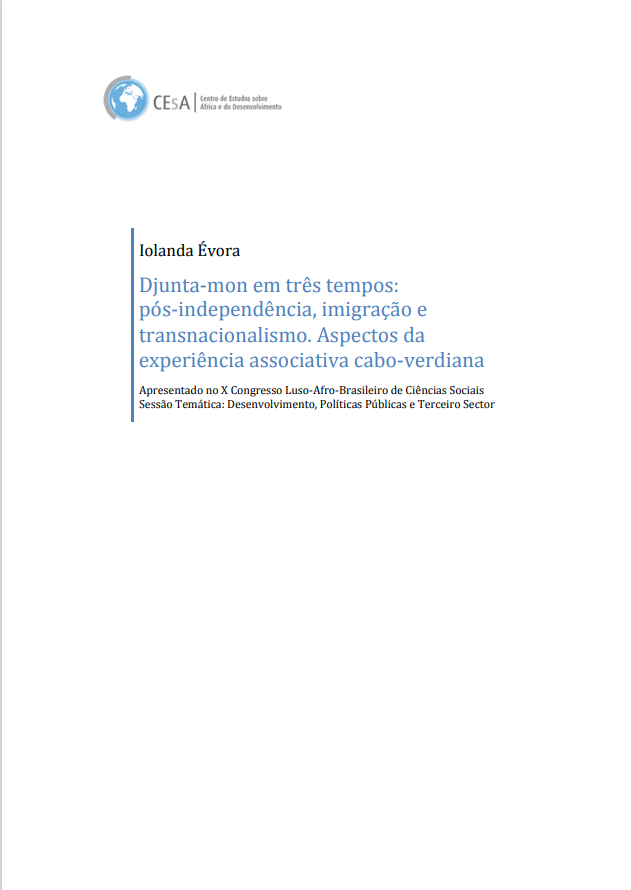
Djunta-mon em Três Tempos: Pós-independência, imigração e transnacionalismo. Aspectos da experiência associativa cabo-verdiana
Abstract:
Djunta-mon em três tempos: pós-independência, imigração e transnacionalismo. Aspectos da experiência associativa cabo-verdiana focuses on voluntary associations and discusses the material and psychosocial conditions of membership and participation of members. These aspects are analyzed from the point of view of the members of cooperatives in the rural area of the island of Santiago, created in the post-independence period, and of Cape Verdean immigrant associations in Portugal. In Santiago, we identified both singular forms of appropriation of the official ideological base and governmental objectives, as well as cultural permanences that, through practices such as djunta-mon, ensure the protection of social identities and allow familiarity and subjective control of this social practice. . In immigration, spontaneous associations propose to maintain identity, promote social inclusion or solve common problems and needs and reflect the heterogeneity, social cleavages and class divisions of origin that are reproduced in immigration. Currently, formal demands for greater rigor and technical and human competence in its functioning seem to weaken spontaneous and voluntary adhesion and the djunta-mon. At the same time, it questions the traditional role of these associations in the face of changes in immigration with the inclusion of new profiles such as transnational migrants. We examine the adaptability of this collective strategy, indicating that in the past, in the present and in the face of the possibility of a transnational associative practice, the use of the traditional djunta mon adapted to the lived context, ensures the maintenance of the strong network of reciprocity and sociability essential to survival and success. of the associations.
Quotation:
Évora, Iolanda. 2011. “Djunta-mon em três tempos: pós-independência, imigração e transnacionalismo. Aspectos da experiência associativa cabo-verdiana”. Comunicação apresentada no X Congresso Luso-Afro-Brasileiro de Ciências Sociais, Sessão Temática Desenvolvimento, Políticas Públicas e Terceiro Sector
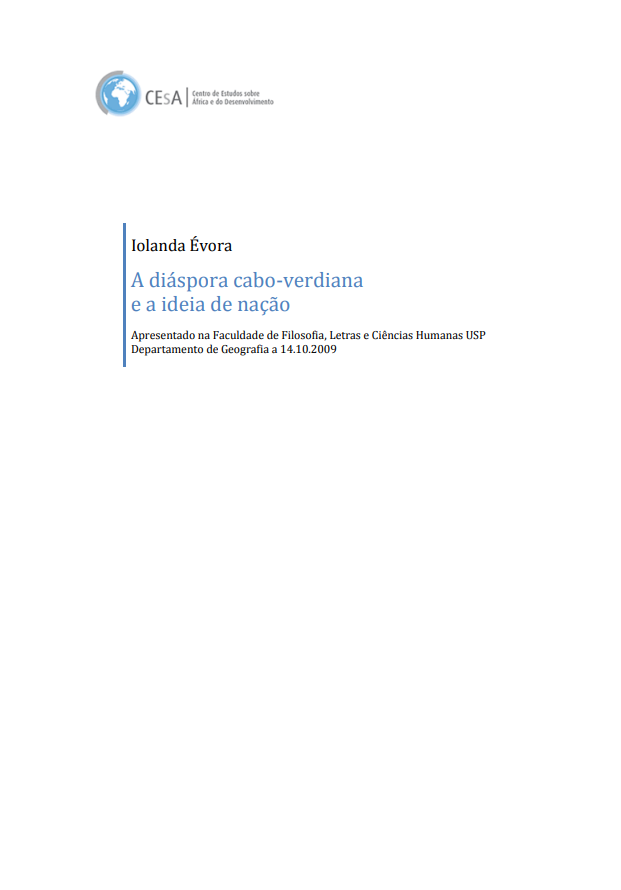
A Diáspora Cabo-verdiana e a Ideia de Nação
Abstract:
Starting from the notion of place as a horizon of connections, of productions of meanings and of struggles, the perspective we adopt highlights, on the one hand, a series of issues that have been little addressed, and, at the same time, shows its potential in the re-elaboration of the migratory phenomenon as a whole (which includes, for example, a psychosociology of the place of origin as a fundamental part of a diaspora nation as well). In addition to this interest from a social and academic place, there is no doubt that the topic “diaspora and nation”, when referred to Cape Verde, already arouses interest, that is, it is an impertinent (because provocative) subject, if we think about the mismatch between the geographical territoriality of the country (ten islands and 4033 km2 ) and the national (the islands and the diaspora). This means that it immediately indicates a challenge because geographical proximity is not adopted here as the criterion for defining a nation. On the contrary, in the case of Cape Verde, it is stated that the nation, in its definition, is only attainable if one also considers those who are physically distant from the territorial place called Cape Verde. A diáspora cabo-verdiana e a ideia de nação was delivered at the Faculdade de Filosofia, Letras e Ciências Humanas USP Departamento de Geografia on 14.10.2009.
Quotation:
Évora, Iolanda. 2011. “A diáspora cabo-verdiana e a ideia de nação”. Comunicação apresentada na Faculdade de Filosofia, Letras e Ciências Humanas, USP Departamento de Geografia, Brasil.





